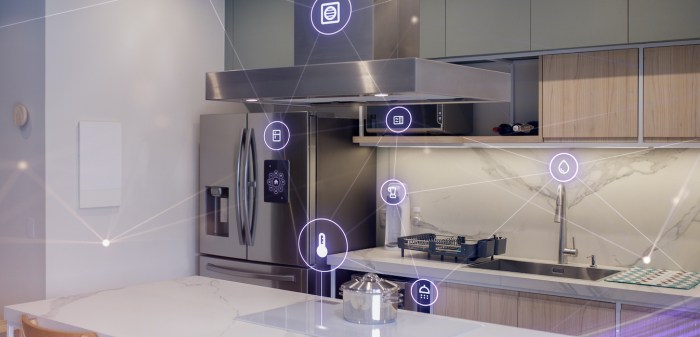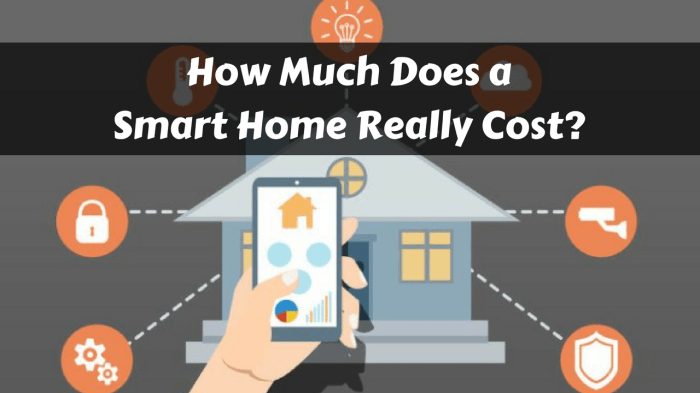Smart home system cost comparison and budget planning is a crucial step in realizing the dream of a connected and automated home. While the allure of smart homes is undeniable, it’s essential to approach the investment with a well-defined budget and a clear understanding of the costs involved.
This guide explores the intricacies of smart home system costs, providing a comprehensive breakdown of essential components, installation options, and financing choices. It equips you with the knowledge to make informed decisions and ensure a seamless transition into a smart home lifestyle.
From the initial purchase of hubs, sensors, and smart appliances to the ongoing costs of energy consumption and maintenance, we delve into every aspect of smart home system pricing. We also examine the trade-offs between DIY and professional installation, highlighting the advantages and disadvantages of each approach.
Ultimately, this guide empowers you to navigate the complexities of smart home system costs, enabling you to create a budget that aligns with your needs and financial goals.
Long-Term Cost Considerations: Smart Home System Cost Comparison And Budget Planning

While the initial investment in a smart home system might seem substantial, it’s crucial to consider the long-term cost implications. Understanding these factors can help you make informed decisions and determine if a smart home system aligns with your budget and long-term goals.
Energy Consumption and Savings, Smart home system cost comparison and budget planning
Smart home systems can significantly impact your energy consumption and potentially lead to cost savings. By automating appliances and lighting, you can optimize energy usage, reducing your electricity bill.
- Smart thermostats:Programmable thermostats can automatically adjust temperatures based on your schedule, ensuring you’re not heating or cooling an empty house. Studies show that smart thermostats can reduce energy consumption by 10-15%, translating into significant savings over time.
- Smart lighting:Smart bulbs can be programmed to turn off automatically when you leave a room or when natural light is sufficient. This can lead to substantial savings on your electricity bill, especially if you have a large home with multiple light fixtures.
- Smart appliances:Smart appliances like refrigerators, washing machines, and dishwashers can optimize energy consumption by running only when necessary. For example, a smart refrigerator can monitor food levels and adjust its cooling settings to minimize energy use.
Maintenance and Repair Costs
While smart home systems offer convenience, they also require ongoing maintenance and potential repair costs.
- Software updates:Regular software updates are crucial for maintaining security and functionality. These updates are usually automatic but can sometimes require manual intervention.
- Hardware upgrades:As technology evolves, your smart home devices may require upgrades to ensure compatibility and functionality. This can involve replacing older devices with newer models or purchasing additional components.
- Repair costs:Like any electronic device, smart home components can malfunction or break down. Repairing or replacing faulty devices can incur additional costs.
Return on Investment
The long-term return on investment for a smart home system depends on several factors, including the initial cost, energy savings, and the potential for increased home value.
- Energy savings:As mentioned earlier, smart home systems can reduce your energy consumption, leading to cost savings. The return on investment depends on the efficiency of your devices and your energy usage patterns.
- Increased home value:A well-integrated smart home system can enhance your home’s value, making it more attractive to potential buyers. However, the impact on home value can vary depending on the market and the specific features of the system.
- Convenience and comfort:Smart home systems offer convenience and comfort, enhancing your lifestyle. While these benefits are not quantifiable in financial terms, they can contribute to a higher quality of life.
Closure

Embarking on the journey to a smart home is an exciting endeavor, filled with possibilities for enhanced comfort, convenience, and energy efficiency. However, the financial implications should not be overlooked. By understanding the cost breakdown, exploring budget strategies, and considering long-term implications, you can make informed decisions that align with your financial capabilities.
With a well-planned approach, you can embrace the transformative power of smart home technology while ensuring a responsible and sustainable investment.
Smart home systems can offer convenience and efficiency, but it’s crucial to consider the cost and plan your budget accordingly. For those living in smaller spaces, choosing the right system is key. Check out our guide on the Best Smart Home System for Small Apartments to find options that are both functional and budget-friendly.
By comparing different systems and understanding your needs, you can make an informed decision that fits your budget and enhances your living experience.
While comparing smart home system costs and budgeting for your ideal setup, it’s crucial to consider the security implications. As your home becomes more connected, it’s essential to understand the potential risks and implement mitigation strategies. A comprehensive guide on Smart Home System Security Risks and Mitigation Strategies can help you navigate these complexities, ensuring a secure and comfortable smart home environment.
By factoring in security measures, you can make informed decisions about your smart home investment, balancing functionality with peace of mind.
When considering a smart home system, cost comparison and budget planning are essential. You’ll want to weigh the benefits of different systems and their features, like sleek design, which can enhance convenience and efficiency. For a deeper dive into the aesthetics of smart home systems, check out this article: Smart Home System with Sleek Design: Enhancing Convenience Efficiency and Aesthetics.
Once you’ve established your budget and desired features, you can confidently choose a system that aligns with your needs and preferences.